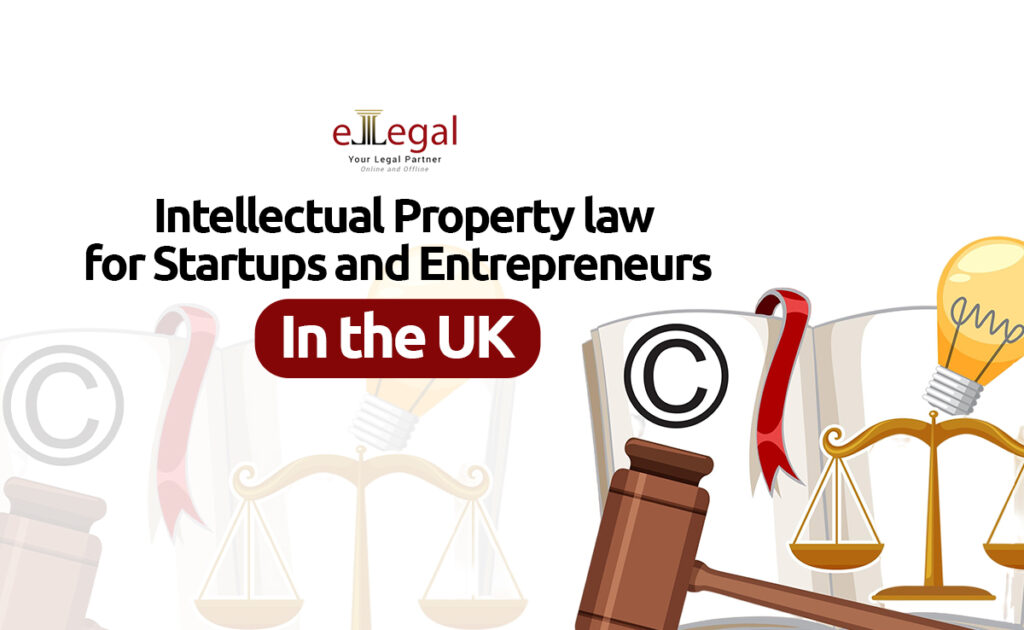Intellectual Property (IP) serves as a fundamental element of innovation and represents a vital resource for startups and entrepreneurs in the United Kingdom. Ignorance regarding Intellectual Property can be detrimental. Startups often find themselves unintentionally infringing on established IP rights or failing to adequately protect their own, which may result in legal disputes that waste both time and resources. A thorough understanding of IP rights is imperative for business success, and startups equipped with this insight are more capable of successfully navigating the business arena, fostering innovation, and advancing their enterprises toward prosperity. This blog offers an extensive overview of IP law, emphasizing essential components pertinent to startups and entrepreneurs operating within the UK.
What is Intellectual Property?
Intellectual Property encompasses the products of the human intellect, including inventions, literary and artistic works, designs, symbols, names, and images utilized in commercial activities. The laws governing intellectual property provide exclusive rights to creators, allowing them to manage and profit from their innovations and creations. For startups and entrepreneurs, the protection of intellectual property can play a crucial role in attaining success, preserving innovations, and attracting investment.
Types of Intellectual Property
Understanding the various types of IP is crucial for startups to effectively protect and manage their assets. In the UK, IP rights are categorized into several distinct types:
- Patents: Protect new inventions or processes, granting the inventor exclusive rights to use, make, sell, or license the invention for up to 20 years. To qualify, an invention must be novel, involve an inventive step, and be capable of industrial application.
- Trademarks: Protect brands, including names, logos, slogans, and other distinctive signs that distinguish goods or services. Trademark protection helps prevent competitors from using similar marks that could confuse consumers. Trademarks can be registered for 10 years, renewable indefinitely.
- Design Rights: Protect the appearance of a product, including its shape, texture, and colour. Design rights can be registered (providing up to 25 years of protection) or unregistered (protecting for 15 years).
- Copyright: Protects original literary, artistic, musical, and dramatic works, as well as computer software and databases. Copyright protection is automatic upon creation and lasts for the creator’s lifetime plus 70 years.
- Trade Secrets: Involves confidential business information that provides a competitive edge. Unlike other IP types, trade secrets are not registered but protected through confidentiality agreements and security measures.
The Importance of IP for Startups
For startups, IP is not merely a legal formality but a strategic asset. Here’s why it’s vital:
- Competitive Advantage: Patents, trademarks, and designs can differentiate a startup’s products and services from competitors, making it harder for others to replicate innovations.
- Securing Investments: Attracting investment is a critical factor for startups, as investors frequently seek robust intellectual property portfolios to gauge a company’s potential for growth and innovation. A well-developed IP portfolio can significantly increase a startup’s valuation and make it more attractive to venture capitalists.
- Revenue Generation: IP can be monetized through licensing agreements, franchising, and selling rights, providing additional revenue streams.
- Brand Protection: Trademarks play a crucial role in preserving the identity of a brand, which in turn protects the startup’s reputation and market position from unauthorized use or infringement.
Process of Securing Intellectual Property Rights in the UK
- Conduct an Intellectual Property Audit: Recognize and evaluate all intellectual property assets present within the organization, encompassing patents, trademarks, designs, copyrights, and trade secrets. This process aids in comprehending which assets require protection and the appropriate management strategies for these assets.
- Performing Searches: To mitigate the risk of conflicts or infringement allegations, it is essential to conduct comprehensive searches of existing intellectual property rights databases to confirm that your invention, design, or brand is genuinely original.
- File for IP Protection: Based on the audit, apply for relevant IP protections. For patents, this involves drafting and submitting a patent application to the UK Intellectual Property Office (UKIPO). For trademarks and designs, registration with the UKIPO is necessary.
- Engaging with Examiners: Actively participate in discussions with patent or trademark examiners throughout the review process, responding to any concerns or objections that may arise during the process.
- Implement IP Management Solutions: Leverage IP management applications to oversee deadlines, renewal processes, and the current status of intellectual property rights. Efficient management is essential for the sustained maintenance and safeguarding of IP assets.
- Establish Confidentiality Protocols: It is essential to create internal procedures and confidentiality agreements to protect these intellectual assets effectively
IP Strategy for Startups
Developing a robust IP strategy is essential for maximizing the value of IP assets. Key considerations include:
- Aligning IP with Business Goals: Ensure that the IP strategy supports overall business objectives. For example, if a startup aims to enter international markets, consider global IP protection strategies.
- Monitoring Competitors: Keep an eye on competitors’ IP activities to identify potential infringement risks or opportunities for strategic partnerships.
- Safeguarding Your Intellectual Property Rights Against Infringement: Startups, despite having registered their intellectual property rights, should exercise caution regarding potential infringements that may compromise or reduce the value of their intellectual property. Legal options for safeguarding IP consist of cease-and-desist letters, litigation, and alternative dispute resolution approaches, including mediation and arbitration
IP Protection for businesses and startups in the Diigital Era
The digital era brings forth a unique set of challenges and opportunities in the realm of intellectual property protection. The internet has made it easier to access extensive information and resources, thereby complicating the safeguarding of digital innovations and content.
It is imperative for startups to implement proactive intellectual property strategies that cover their digital products and services. Utilizing technological solutions such as digital rights management (DRM) and encryption is essential for the protection of digital content.
Furthermore, a comprehensive understanding of software patents and copyright laws is vital for technology-driven startups. Given the significance of social media and online visibility for startups, it is crucial to secure domain names and effectively manage digital trademarks.
Continuous monitoring of the digital environment for potential intellectual property infringements, along with the adoption of flexible strategies to address these issues swiftly, is necessary to maintain a competitive advantage.
Challenges and Common Pitfalls
Navigating IP law can be complex, and startups often face several challenges:
- Cost of IP Protection: The expenses associated with intellectual property protection can be significant, particularly for startups operating with constrained financial resources. It is essential to allocate funds for IP-related costs and explore economical alternatives.
- Complexity of IP Law: IP law can be intricate and varies by jurisdiction. Startups may struggle with understanding and applying the laws effectively. Legal advice and professional guidance are essential.
- IP Enforcement: The enforcement of intellectual property rights presents significant challenges, especially for startups that may not have the necessary resources to engage in legal proceedings. It is essential to implement effective monitoring and adopt strategic enforcement measures to tackle this concern.
- Global IP Issues: Expanding into international markets introduces additional complexities, such as differing IP laws and registration requirements. Careful planning and expert advice are crucial.
Conclusion
Navigating intellectual property law is an essential component of establishing and expanding a successful startup in the United Kingdom.
A comprehensive understanding of the various forms of intellectual property, along with the ability to secure and manage these rights, can yield considerable benefits. By aligning intellectual property strategies with business objectives, effectively enforcing rights, and considering international factors, startups can safeguard their innovations, strengthen their market presence, and attain sustainable success.
For entrepreneurs, remaining updated on developments in intellectual property, seeking expert guidance, and actively managing intellectual property assets are crucial for maximizing the potential of intellectual property.
We at eLegal Consultants can help you navigate this terrain, our qualified attorneys are always available to help you out, be it IP protection, registration or helping you understand the IP laws, we are just a click away. Contact us today.




